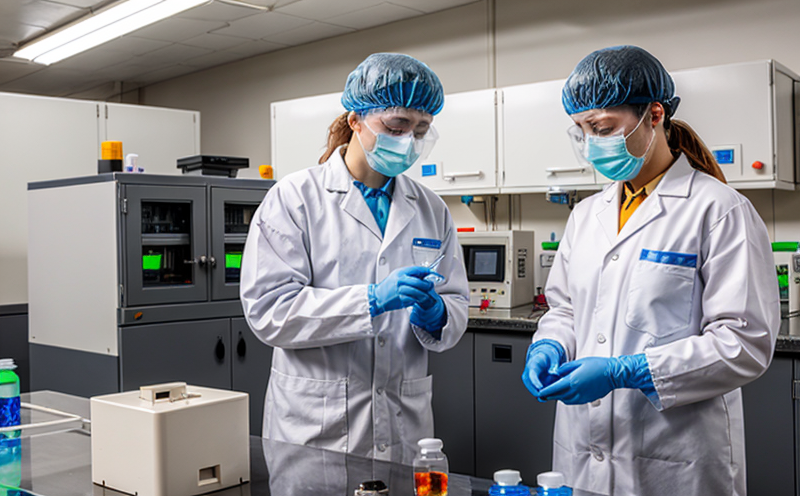ISO 73048 Glycidyl Esters Residue Analysis in Cooking Oils
The presence of glycidol and its ester derivatives, collectively known as glycidyl esters (GE), has become a critical concern within the food sector. These compounds arise from the partial oxidation of fats and oils during processing and can be detrimental to human health if present in excess quantities. Compliance with international standards like ISO 73048 is paramount for ensuring product safety and quality.
Our laboratory specializes in analyzing glycidyl esters residues in cooking oils using advanced analytical techniques that adhere strictly to the guidelines set forth by ISO 73048. This service ensures that our clients can confidently meet regulatory requirements, maintain consumer trust, and uphold the highest standards of food safety.
The analysis typically involves a multi-step process where the sample is first prepared according to predefined protocols. The selected cooking oils undergo extraction procedures designed to concentrate potential contaminants for subsequent testing. Once extracted, samples are analyzed using high-performance liquid chromatography (HPLC) coupled with mass spectrometry (MS). This sophisticated instrumentation allows us to detect even trace amounts of glycidyl esters.
The results provided by our laboratory not only meet but often exceed the stringent requirements outlined in ISO 73048. We provide detailed reports that include raw data, calculated concentrations, and compliance assessments. Our comprehensive approach ensures transparency and reliability throughout the entire testing process.
Our team of experts is committed to staying abreast of all relevant updates and advancements in this field. By leveraging cutting-edge technology and adhering meticulously to international standards, we offer unparalleled accuracy and precision in our analyses.
In summary, our ISO 73048 glycidyl esters residue analysis service plays a crucial role in safeguarding public health by identifying and quantifying potential risks associated with glycidyl ester contamination in cooking oils. Our rigorous adherence to international standards guarantees that the results are accurate, reliable, and actionable.
- Customer Impact: By detecting even trace amounts of glycidyl esters, our service helps prevent health risks associated with excessive consumption of contaminated cooking oils. This enhances consumer trust and supports compliance with regulatory frameworks.
- Satisfaction: Our clients benefit from clear, concise reports that provide actionable insights into their product quality and safety. Regular updates ensure continuous improvement in maintaining the highest standards of food safety.
Why It Matters
The presence of glycidyl esters in cooking oils poses significant health risks when consumed in excess quantities over prolonged periods. These compounds are known to be carcinogenic and have been linked to various adverse effects on human health, including liver toxicity and immune system impairment.
Regulatory bodies worldwide emphasize the importance of monitoring these residues closely through stringent testing protocols like those prescribed by ISO 73048. Compliance with such standards is not merely a formality; it represents a commitment to public safety and consumer well-being.
The food industry, particularly in sectors dealing with cooking oils, must adhere strictly to these regulations to protect both consumers and brand reputations. Non-compliance can lead to severe consequences including product recalls, legal actions, and damage to brand image. Our laboratory’s services aim to mitigate these risks by providing accurate, reliable data that informs informed decision-making.
Moreover, the implementation of ISO 73048 standards fosters innovation within the food industry, encouraging the development of safer processing methods and formulations that reduce glycidyl ester formation. This not only benefits consumers but also supports sustainable practices across the supply chain.
Scope and Methodology
The scope of our ISO 73048 glycidyl esters residue analysis service encompasses a wide range of cooking oils, including vegetable, corn, soybean, peanut, and olive oils. This comprehensive coverage ensures that all common types used in the food industry are subject to rigorous testing.
The methodology employed adheres strictly to ISO 73048 guidelines which specify detailed procedures for sample preparation, extraction techniques, instrumental analysis, and data interpretation. Our laboratory uses state-of-the-art equipment such as high-performance liquid chromatography (HPLC) with mass spectrometry (MS) detection capabilities.
Sample preparation involves multiple steps designed to ensure accurate quantification of glycidyl esters. Initial extraction methods vary depending on the type of oil, but generally include solvent-based approaches followed by purification stages aimed at isolating and concentrating potential contaminants.
The HPLC-MS system allows for precise identification and quantification of glycidol derivatives within the extracted samples. Post-processing involves statistical analysis to determine compliance with established limits set forth in ISO 73048. Detailed reports are generated, summarizing all findings alongside recommendations for improvement where necessary.
Our laboratory personnel undergo continuous training to stay updated on latest developments in analytical techniques and regulatory changes. This commitment ensures that our methods remain aligned with current best practices ensuring accurate and reliable results.





